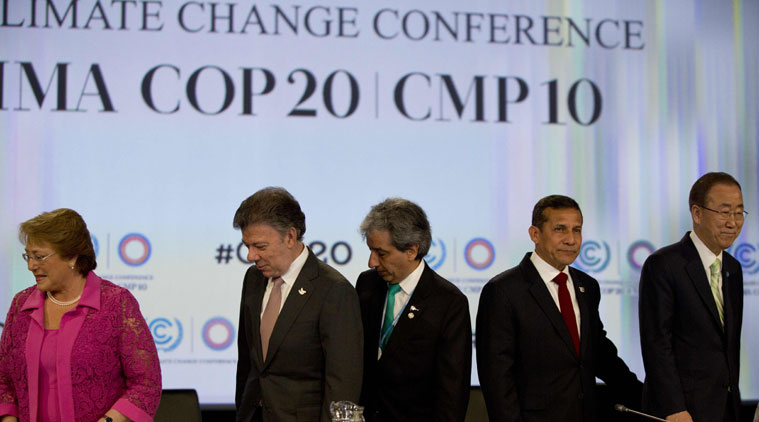Stay updated with the latest - Click here to follow us on Instagram
Climate talks stares at another long-drawn night in Lima
Resolution of several contentious issues were still not in sight and negotiators were planning for another full night of negotiations.
 World leaders meet at Lima Climate Change Conference.
World leaders meet at Lima Climate Change Conference.
It is not the longest COP ever. Not yet. But the fatigue and frustration is evident on the delegates, and everyone else who is remaining at the conference centre in Lima, as the climate talks that were to finish on Friday evening drags on in the hope of crafting a minimalist draft that everyone can have least objections on.
As the meetings reconvened on Saturday morning, a Malaysian delegate lamented that he was supposed to be on a flight to Cusco, the historical city in southern Peru from where tourists travel to the World Heritage Site of Machu Pichhu, but was being forced to spend time in the negotiating room that incidentally was named ‘Cusco’.
Wearied negotiators moved from one informal meeting to the other, carrying with them inventive turn of phrases that were the only hope for reaching any agreement at the climate talks that have been stalled by deep divisions between the developed and developing countries over a range of issues.
But resolution of several contentious issues were still not in sight and negotiators were planning for another full night of negotiations after having spent almost the entire previous night in the meeting rooms. Many ministers and delegates had already taken their long-distance flights out of Peru while a number of others, including India’s Environment Minister Prakash Javadekar, had to reschedule their itineraries to see the conference through.
Big bean bags put on the first floor of the media room to let journalists rest as they worked over the two-weeks talks were taken away on Friday evening but then brought back on Saturday morning as it became clear that the end was still not near.
For the last seven years, COPs, or Conference of Parties (to the UN Framework Convention on Climate Change), as these talks are called, have never finished on their scheduled time, on the Friday evening of the second week. The earliest it managed to wind up during this time was in 2010 in Cancun in Mexico, when the conference ended early in morning on the Saturday. Otherwise, these negotiations have invariably dragged on through most of Saturday. The 2011 meeting in Durban actually went on till the morning of Sunday.
The Lima talks threaten to upstage the Durban record, with the closing plenary still to be convened by 11 at night on Saturday.
“The process drags on because negotiators have ignored the sticking points that have been clear since day one. Whatever happens in the next few hours, one thing is clear: governments will have their work cut out for them next year,” Jan Kowalzig, policy advisor for Oxfam, said.
One of the main contentious issues at the talks has been the issue of ‘differentiation’ between the developed and developing countries, a principle of ‘Common But Differentiated Responsibilities’ enshrined in the UN Framework Convention, that puts the burden of cutting down greenhouse gas emissions mainly on the rich countries because of their “historical responsibility” in polluting the atmosphere. Developing countries are fighting hard to retain this differentiation in the INDCs, or the Intended Nationally-Determined Contributions, that every country has to announce next year as their contribution in the global fight against climate change.
“We bend and we bend, but we cannot bend so much that the flexibility goes beyond the breaking point’, a Malaysian delegate said. The exclusion of provision on loss and damage compensation to countries affected by climate events has got the poor and vulnerable countries extremely agitated.
“Rich nations have been dragging their feet, but we can’t allow these essential elements to slip off the table when we know that climate crises are going to get far worse with rising temperatures. The exclusion of a separate provision will fail the very people the treaty should be protecting,” said Harjeet Singh, International Manager for Resilience and Climate Change for ActionAid International.
Countries were waiting for another new draft text to be circulated when the closing plenary convenes on late Saturday night.
- 01
- 02
- 03
- 04
- 05































